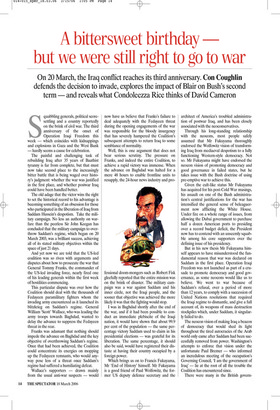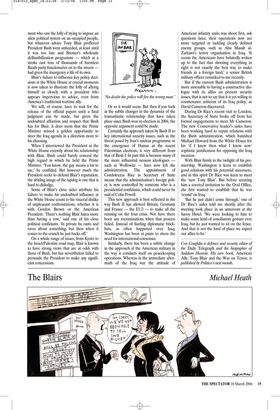A bittersweet birthday — but we were still right to go to war
On 20 March, the Iraq conflict reaches its third anniversary. Con Coughlin defends the decision to invade, explores the impact of Blair on Bush’s second term — and reveals what Condoleezza Rice thinks of David Cameron Squabbling generals, political scoresettling and a country reportedly on the brink of civil war. The third anniversary of the onset of Operation Iraqi Freedom this week — which coincides with kidnappings and explosions in Gaza and the West Bank — hardly seems a cause for celebration.
The painful and challenging task of rebuilding Iraq after 35 years of Baathist tyranny is far from complete, but that must now take second place to the increasingly bitter battle that is being waged over history’s judgment: whether the war was justified in the first place, and whether postwar Iraq could have been handled better.
The old adage that the victor wins the right to set the historical record to his advantage is becoming something of an obsession for those who participated in the liberation of Iraq from Saddam Hussein’s despotism. Take the military campaign. No less an authority on warfare than the peerless Sir John Keegan has concluded that the military campaign to overthrow Saddam’s regime, which began on 20 March 2003, was a brilliant success, achieving all of its stated military objectives within the space of just 21 days.
And yet now we are told that the US-led coalition was so riven with arguments and disputes about how to prosecute the war that General Tommy Franks, the commander of the US-led invading force, nearly fired one of his leading generals within the first week of hostilities commencing.
This particular dispute was over how the Coalition should deal with the thousands of Fedayeen paramilitary fighters whom the invading army encountered as it launched its blitzkrieg on Saddam’s regime. General William ‘Scott’ Wallace, who was leading the army troops towards Baghdad, wanted to delay the advance to suppress the Fedayeen threat in the rear.
Franks was adamant that nothing should impede the advance on Baghdad and the key objective of overthrowing Saddam’s regime. Once that had been achieved, the Coalition could concentrate its energies on mopping up the Fedayeen remnants, who would anyway pose less of a threat once Saddam’s regime had suffered a humiliating defeat.
Wallace’s supporters — drawn mainly from the usual anti-war suspects — would now have us believe that Franks’s failure to deal adequately with the Fedayeen threat during the opening engagements of the war was responsible for the bloody insurgency that has severely hampered the Coalition’s subsequent attempts to return Iraq to some semblance of normality.
Well, this is one argument that does not bear serious scrutiny. The pressure on Franks, and indeed the entire Coalition, to achieve a rapid victory was immense. When the advance on Baghdad was halted for a mere 48 hours to enable frontline units to resupply, the 24-hour news industry and pro fessional doom-mongers such as Robert Fisk gleefully reported that the entire mission was on the brink of disaster. The military campaign was a war against Saddam and his inner circle, not the Iraqi people, and the sooner that objective was achieved the more likely it was that the fighting would stop.
I was in Baghdad shortly after the end of the war, and if it had been possible to conduct an immediate plebiscite of the Iraqi nation, it would have shown that about 99.9 per cent of the population — the same percentage victory Saddam used to claim in his presidential elections — was grateful for its liberation. The same percentage, it should also be said, would have registered their distaste at having their country occupied by a foreign power.
Which brings us on to Francis Fukuyama, Mr ‘End of History’ himself. Mr Fukuyama is a good friend of Paul Wolfowitz, the former US deputy defence secretary and the architect of America’s troubled administration of postwar Iraq, and has been closely associated with the neoconservatives.
Through his long-standing relationship with the neocons, most people safely assumed that Mr Fukuyama thoroughly endorsed the Wolfowitz vision of transforming Iraq from mediaeval despotism to a fully functioning Western-style democracy. Not so. Mr Fukuyama might have endorsed the neocon vision of promoting democracy and good governance in failed states, but he takes issue with the Bush doctrine of using pre-emptive war to achieve this.
Given the cult-like status Mr Fukuyama has acquired for his post-Cold War musings, his assault on one of the Bush administration’s central justifications for the war has intensified the general sense of beleaguerment now afflicting the White House. Under fire on a whole range of issues, from allowing the Dubai government to purchase half a dozen American ports to presiding over a record budget deficit, the President now has to contend with an unseemly squabble among his core supporters over the defining issue of his presidency.
But in his new thesis Mr Fukuyama himself appears to have misunderstood the fundamental reason that war was declared on Saddam in the first place. Operation Iraqi Freedom was not launched as part of a crusade to promote democracy and good governance, as some neocons would like us to believe. We went to war because of Saddam’s refusal, over a period of more than 12 years, to comply with a succession of United Nations resolutions that required the Iraqi regime to dismantle, and give a full account of, its weapons of mass destruction stockpiles which, under Saddam, it singularly failed to do.
The neocon vision of making Iraq a beacon of democracy that would shed its light throughout the tired autocracies of the Arab world only came after Saddam had been successfully removed from power. Washington’s attempts to enforce that vision under the unfortunate Paul Bremer — who informed an incredulous meeting of the occupation’s Governing Council, ‘I am the government of Iraq’ — lie at the root of all the trouble the Coalition has encountered since.
There were many in the British govern ment who saw the folly of trying to impose an alien political system on an occupied people, but whatever advice Tony Blair proffered President Bush went unheeded, at least until it was too late and Bremer’s wholesale deBaathification programme — which at a stroke cast tens of thousands of harmless Baath party functionaries on to the streets had given the insurgency a life of its own.
Blair’s failure to influence key policy decisions at the White House at crucial moments is now taken to illustrate the folly of allying himself so closely with a president who appears impervious to advice, even from America’s traditional wartime ally.
We will, of course, have to wait for the release of the official papers until a final judgment can be made, but given the undoubted affection and respect that Bush has for Blair, it does seem that the Prime Minister missed a golden opportunity to steer the Iraq agenda in a direction more to his choosing.
When I interviewed the President at the White House recently about his relationship with Blair, Bush could barely conceal the high regard in which he held the Prime Minister. ‘You know, the guy means a lot to me,’ he confided. But however much the President seeks to defend Blair’s reputation, the abiding image of the lapdog is one that is hard to dislodge.
Some of Blair’s close aides attribute his failure to make his undoubted influence at the White House count to his visceral dislike of unpleasant confrontations, whether it is with Gordon Brown or the American President. ‘There’s nothing Blair hates more than having a row,’ said one of his close political confidants. ‘In private he rants and raves about something, but then when it comes to the crunch he just backs off.’ On a whole range of issues, from Kyoto to the Israel/Palestine road map, Blair is known to have strong views that are at odds with those of Bush, but has nevertheless failed to persuade the President to make any significant concessions. Or so it would seem. But then if you look at the subtle changes in the dynamics of the transatlantic relationship that have taken place since Bush won re-election in 2004, the opposite argument could be made.
Certainly the approach taken by Bush II to key international security issues, such as the threat posed by Iran’s nuclear programme or the emergence of Hamas at the recent Palestinian elections, is very different from that of Bush I. In part this is because many of the more influential neocon ideologues such as Wolfowitz — have now left the administration. The appointment of Condoleezza Rice as Secretary of State means that the administration’s foreign policy is now controlled by someone who is a presidential confidante, which could never be said of Colin Powell.
This new approach is best reflected in the way Bush II has allowed Britain, Germany and France — the EU3 — to make all the running on the Iran crisis. Nor have there been any recriminations when that process failed. Instead of hurling diplomatic brickbats, as often happened over Iraq, Washington has been at pains to stress the need for international consensus.
Similarly, there has been a subtle change in the approach of the American military in the way it conducts itself on peacekeeping operations. Whereas in the immediate aftermath of the Iraq war the attitude of American infantry units was shoot first, ask questions later, their operations now are more targeted at tackling clearly defined enemy groups, such as Abu Musab alZarkawi’s terror organisation in Iraq. ‘It seems the Americans have belatedly woken up to the fact that shooting everything in sight is not exactly the best way to make friends in a foreign land,’ a senior British military officer remarked to me recently.
But if the current Bush administration is more amenable to having a constructive dialogue with its allies on present security issues, that is not to say that it is yet willing to countenance criticism of its Iraq policy, as David Cameron discovered.
During Dr Rice’s recent visit to London, the Secretary of State broke off from her formal engagements to meet Mr Cameron. The new Conservative leader’s aides have been working hard to repair relations with the Bush administration, which banished Michael Howard from the White House for his ‘if I knew then what I know now’ sophistic justification for opposing the Iraq invasion.
With Blair firmly in the twilight of his premiership, Washington is keen to establish good relations with his potential successors, and in this spirit Dr Rice was keen to meet the ‘new Tony Blair’. But before securing him a coveted invitation to the Oval Office, she first wanted to establish that he was ‘sound’ on Iraq.
‘But he just didn’t come through,’ one of Dr Rice’s aides told me shortly after the meeting took place in an anteroom at the Savoy Hotel. ‘We were looking to him to make some kind of conciliatory gesture over Iraq, but he just wanted to sit on the fence. And that is not the kind of place we expect our allies to be.’



















































































 Previous page
Previous page